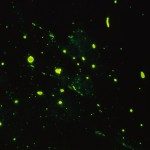Lien vers Pubmed [PMID] – 27706156
PLoS Negl Trop Dis 2016 Oct;10(10):e0005010
One root cause of the neglect of rabies is the lack of adequate diagnostic tests in the context of low income countries. A rapid, performance friendly and low cost method to detect rabies virus (RABV) in brain samples will contribute positively to surveillance and consequently to accurate data reporting, which is presently missing in the majority of rabies endemic countries.


